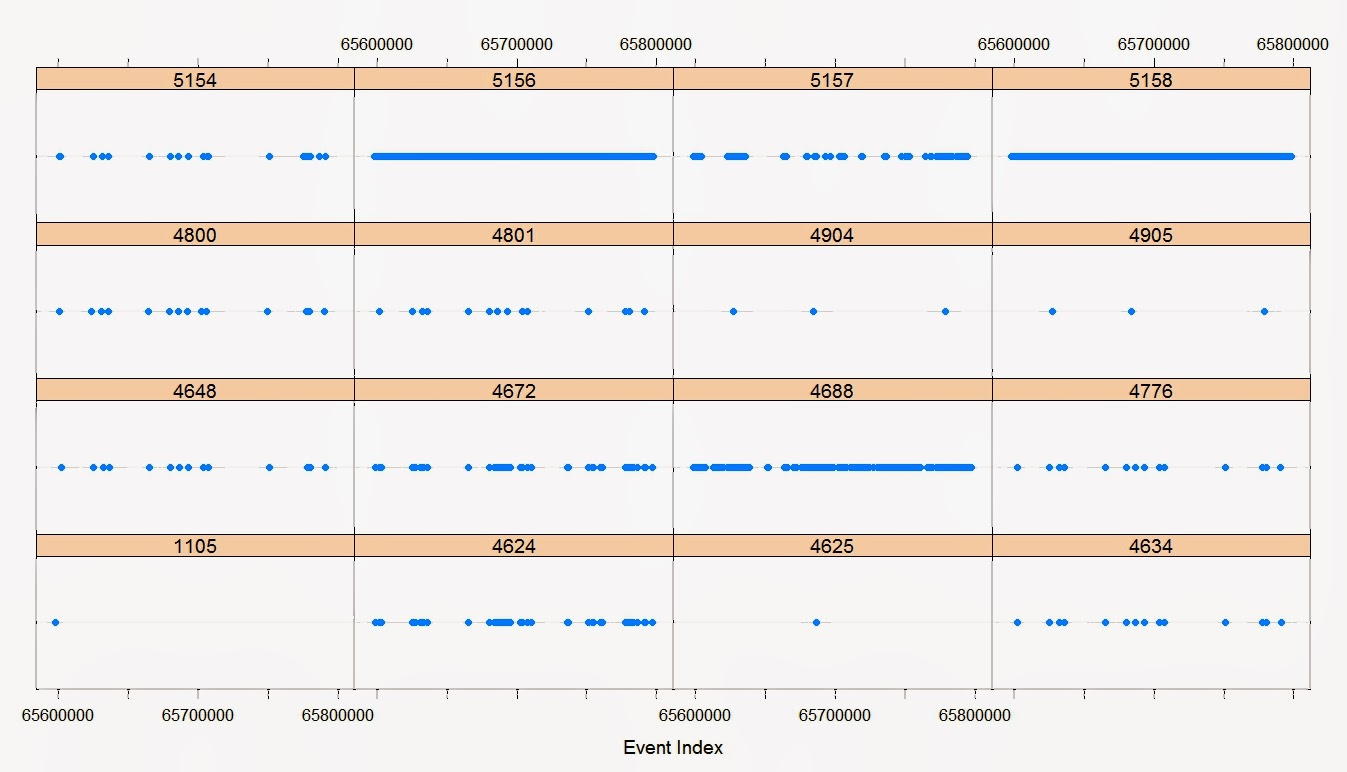(under construction; updated 4/16/2014)
Working with such large files in R has proved to be a real challenge for 4 GB RAM. I am studying various methods to overcome some of the challeges, but also am considering just working in Postgres or RPostgresSQL.
Once EVTX logs are in CSV format, R has the potential to parse them effectively, although I believe I am one tricky use of 'reshape' from doing this in the script below.
Historic blog. No longer active. See Also http://horizontal-logic.blogspot.com for more Powershell code. AS of 2/27/2014 all Scripts are PS 4.0.
Thursday, February 27, 2014
Avoiding XPath: Part IV
Full source of my unpolished cruft is far below. If you are going to pull fields out of the Message in Windows Event log without Xpath or XML, how are you going to do it in Powershell 4.0? I will remind you of what the Message field looks like:
Message : The Windows Filtering Platform has permitted a connection.
Application Information:
Process ID: 3116
Application Name: \device\harddiskvolume3\users\rferrisx\appdata\local\chromium\application\chrome.exe
Network Information:
Direction: Outbound
Source Address: 192.168.0.11
Source Port: 2094
Destination Address: 8.247.65.200
Destination Port: 80
Protocol: 6
Filter Information:
Filter Run-Time ID: 211332
Layer Name: Connect
Layer Run-Time ID: 48
So I can get to these fields with 'properties':
Message : The Windows Filtering Platform has permitted a connection.
Application Information:
Process ID: 3116
Application Name: \device\harddiskvolume3\users\rferrisx\appdata\local\chromium\application\chrome.exe
Network Information:
Direction: Outbound
Source Address: 192.168.0.11
Source Port: 2094
Destination Address: 8.247.65.200
Destination Port: 80
Protocol: 6
Filter Information:
Filter Run-Time ID: 211332
Layer Name: Connect
Layer Run-Time ID: 48
So I can get to these fields with 'properties':
Wednesday, February 12, 2014
Avoiding XPath : Part III
(under construction)
 |
| Time sequenced lattice chart of 417,834 Windows Security log entries. |
This cruft is similar to my post Avoiding XPath : Part II. However, here I am (laboriously) converting EVTX to CSV with Powershell 3.0. The files are sizeable, taking about an hour to convert to CSV. The charts take a non-negligible amount of time to load on my i5 4GB laptop.
Saturday, February 8, 2014
Avoiding XPath : Part II
(under construction)
There are a number of issues in understanding Windows security event logging (Auditing). Every 2 - 8 weeks I collect a 614MB Security archive with just my laptop and the audit categories below. Visualizing and manipulating this data effectively... Here are some solutions using Powershell with R 3.01.
Avoiding XPath: Part I
Typically a Security Event Log entry contains a Message entry that is resistant to anything but an XPath query:
Index : 65597968
TimeGenerated : 1/29/2014 1:32:01 PM
EventID : 5158
Message : The Windows Filtering Platform has permitted a bind to a local port.
Application Information:
Process ID: 200
Application Name: \device\harddiskvolume3\program files (x86)\google\chrome\application\chrome.exe
Network Information:
Source Address: ::
Source Port: 49837
Protocol: 17
Filter Information:
Filter Run-Time ID: 0
Layer Name: %%14608
Layer Run-Time ID: 38
We can shelve the XPath query by using a combination of Powershell and R to dump the Message field to a single line text entry in a CSV. Using .NET interfaces to dump the first 1000 Security log entries:
Index : 65597968
TimeGenerated : 1/29/2014 1:32:01 PM
EventID : 5158
Message : The Windows Filtering Platform has permitted a bind to a local port.
Application Information:
Process ID: 200
Application Name: \device\harddiskvolume3\program files (x86)\google\chrome\application\chrome.exe
Network Information:
Source Address: ::
Source Port: 49837
Protocol: 17
Filter Information:
Filter Run-Time ID: 0
Layer Name: %%14608
Layer Run-Time ID: 38
We can shelve the XPath query by using a combination of Powershell and R to dump the Message field to a single line text entry in a CSV. Using .NET interfaces to dump the first 1000 Security log entries:
Subscribe to:
Comments (Atom)
